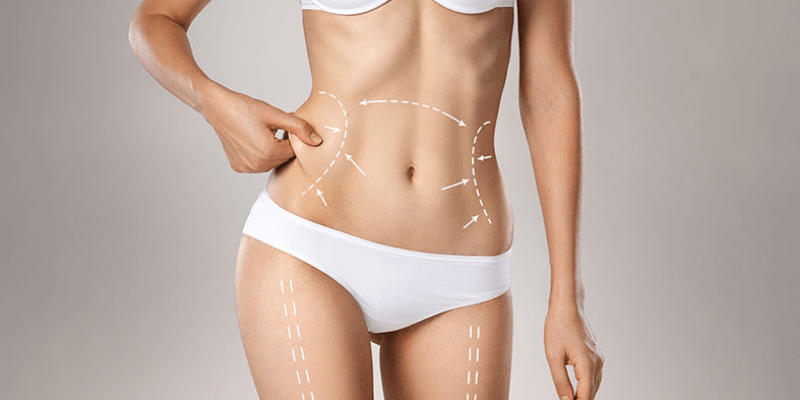Does Insurance Cover Body Lift After Weightloss Surgery?
Does insurance cover body lift after weightloss surgery? Many patients find it rewarding to work hard to get to a healthy weight, but losing weight is only one part of the battle. People who have lost a lot of weight often have sagging skin, which is not something that can be fixed by exercise. Luckily, the field of cosmetic surgery has come up with many effective ways to get rid of the side effects of losing a lot of weight. When a person has lost that much weight, a body lift can get rid of the extra skin and give definition to places where there was once too much fat.
Most of the time, the first question I get from people who want to see me is, “Will my insurance cover this?” Many people think that all cosmetic procedures are optional and should be paid for by the patient. But that’s not true for a body lift, because most health insurance plans cover at least part of the cost.
Even though insurance companies don’t usually pay for cosmetic procedures, some body contouring procedures are considered necessary to improve a patient’s overall health.
How Does Insurance Cover Body Lift After Weightloss Surgery?
If the patient had surgery at least a year ago, their health insurance may help pay for body-contouring surgery. When a person has lost more than 100 pounds, their insurance company is more likely to help pay for a body lift.
Many health insurance companies want to see proof that a person has lost weight and kept it off. If a person has kept the same weight for at least 6 months, the insurance company is likely to help pay for the surgery.
Body Lift After Weight Loss
Extra skin can cause chafing, rashes, ulcers, and infections, among other health problems. If a patient has any of these problems and other medical treatments haven’t helped, their insurance company may pay to get rid of the extra skin.
Still, some parts of a body lift, like breast augmentation, are considered elective surgery and would have to be paid for out of pocket. Since each health insurance policy is different, the only way to find out if a patient’s body sculpting procedure would be covered is to talk to the insurer. No matter how a patient pays, it’s our job to help them take the next step in their weight loss journeys so they can look and feel their best.
How To Get Rid Of Sagging After Weight Loss?
Different kinds of plastic (cosmetic) surgery to get rid of extra skin. Your body can be changed by surgery. If you lose a lot of weight, you may need body contouring (typically 100 pounds or more).
Who is affected by too much skin? People who are overweight can lose weight through bariatric surgery, a healthy diet, and exercise. When you lose a lot of weight, your skin can get loose and sag. When you carry extra weight, your skin and other tissues stretch to fit your bigger body. Skin and other tissues lose their elasticity because of this stretching. When you lose weight, the stretched skin can’t fit your new shape and may be loose and saggy.Plastic Surgery Is Weightloss Procedures
Why Should You Get Body Lift After Weight Loss?
Having too much skin can make you feel bad about yourself. Finding clothes that fit well can be hard. It hurts to have thick skin. Skin folds can also make you more likely to get skin infections, rashes, and fungus.
Who can have surgery to get rid of extra skin? Plastic surgeons, who are sometimes called cosmetic surgeons, do procedures to get rid of extra skin. Your doctor will do a physical exam and other tests to figure out if you need surgery. In general, you might be a good candidate for surgery to get rid of extra skin if:
- Keep your goal weight for at least six months after you’ve lost a lot of weight.
- Commit to a healthy lifestyle, which includes eating well and staying active, to help keep the weight off.
- Don’t smoke or use other things made with tobacco. Smoking slows the healing of wounds and can increase the risk of problems after surgery.
- Are in good health overall and don’t have any major health problems that could make surgery too dangerous.
- Set your goals for what the procedures can do in a realistic way.
There are a few different ways to get rid of extra skin. Most people need more than one surgery to look the way they want to. Your doctor can help you figure out which procedures are most likely to help you.
Types Of Body Lift Procedures
Arm lifts (brachioplasty) are used to get rid of loose skin on the upper arm. A breast lift (mastopexy) tightens the breast tissue and removes extra skin to make the breasts firmer. With a facelift (rhytidectomy), your face will look smoother and younger, and the extra skin around your neck will be gone.
Lifting your lower body will help you get rid of extra skin and fat in your stomach, buttocks, and outer thighs. Panniculectomy is a surgery to remove the apron of extra skin (called an apanniculus) that hangs below your belly button. FUE Transplant
Thigh lift to make the inside of your thighs look smoother. Tummy tuck (abdominoplasty) to get rid of extra skin and tighten abdominal muscles that are weak or have come apart.
What Should You Expect After Body Lift?
When getting ready for surgery, do what your doctor tells you to do. You may need to:
- Get blood work
- Stop taking aspirin and other medicines that make bleeding more likely, like nonsteroidal anti-inflammatory drugs
- Don’t smoke or use tobacco products anymore
What happens during surgery to get rid of extra skin?
Depending on what needs to be done, you might have surgery at a hospital and stay there for the night. Or, the surgery may be done in a hospital, and you’ll go home the same day (outpatient procedure). Excess skin removal often takes place in stages. You might need more than one surgery. Some surgeries, like a lower body lift or a panniculectomy along with a tummy tuck, can be done at the same time.
Does Insurance Cover Gastric Sleeve in Turkey?
When it comes to answering, “does insurance cover gastric sleeve in Turkey?” it can be tricky. As one can expect, insurance coverage for gastric sleeve surgery depends on the individual’s health plan. Some plans may cover the entire procedure, while others may only cover a portion.
Check with your health plan provider to discuss your eligibility in “is gastric sleeve covered by insurance?” and the costs you may be responsible for. Moreover, many insurance companies require approval from their medical review board before approving any procedure, so it is essential to work closely with your doctor and insurance provider when considering this type of surgery.

If an individual’s policy does not cover gastric sleeve surgery, they should investigate other options, such as purchasing a supplemental plan or seeking financing options from a medical provider. Additionally, there are other ways to receive financial assistance for the procedure. Every person’s situation is different, so you must contact your doctor or healthcare provider if you have questions about getting financial assistance for gastric sleeve surgery. For information besides “does insurance cover gastric sleeve in Turkey?” regarding the surgery, contact Aslı Tarcan clinic to reserve your free consultation.





